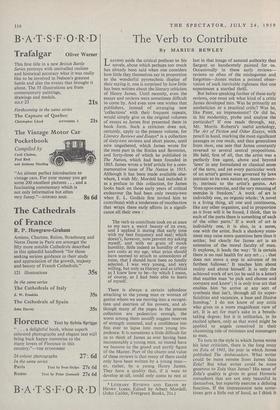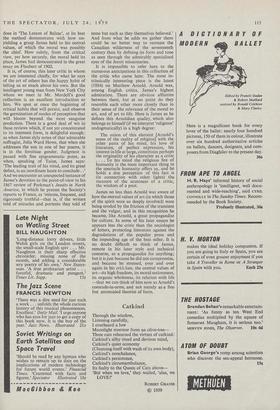The Verb to Contribute
By MARIUS BEWLEY
LEAVING aside the critical prefaces to his novels, about which perhaps too much has already been said when one considers how little they themselves say in proportion to the wonderful pyrotechnic display of their saying it, one is surprised by how little has been written about the literary criticism of Henry James. Until recently, even the essays and reviews were sometimes difficult to come by. And even now one wishes that publishers, instead of arranging new 'collections' with their frequent repeats, would simply give us the original volumes of essays as James first presented them in book form. Such a criticism does not, certainly, apply to the present volume, for Literary Reviews and Essays* is a collection of sixty-two reviews and short pieces, until now ungathered, which James wrote for the most part in the Sixties and Seventies, and forty-throe of which he published in The Nation, which had been founded in 1865. James wrote a brief article for a com- memorative issue of The Nation in 1915. Although it has been made available else- where, I wish Mr. Mordell had included it as a preface to this collection, for James looks back on those early years of critical endeavour (he had been only twenty-two when E. L. Godkin first invited him to contribute) with a tenderness of recollection that wraps these early efforts in a signifi- cance all their own :
The verb to contribute took on at once to my ears a weird beauty of its own, and I applied it during that early time with my best frequency and zeal; which doesn't, however, now prevent my asking myself, and with no grain of mock humility, little indeed as humility of any sort costs at my age, what price should have seemed to attach to antecedents of mine, that I should have been so fondly selected. I was very young, and very willing, but only as literary and as critical as I knew how to be—by which I mean, of course, as I had been able to learn of myself.
There is always a certain splendour attaching to the young man or woman of genius whom we see moving into a recogni- tion and exertion of his powers, and al- though many of the pages in the present collection are pedestrian enough, the worst among them usually suggest reserves of strength untested, and a confidence too fine ever to lapse into mere young im- pudence. It is sometimes a little difficult for US to think of James as ever having been incontestably a young man, so inured have we become to the grand and portly figure of the Master. Part of the charm and value of these reviews is that many of them could only have been written by a young man- or, rather, by a young Henry James. They have a quality that, if it were to develop at all, could only come to rest at * LITERARY REVIEWS AND ESSAYS BY HENRY JAMES. Edited by Albert Mordell. (John Calder, Evergreen Books, 21s.) last in that image of assured authority that Sargent so handsomely painted for us. Occasionally in these early reviews— reviews so often of the misbegotten and forgotten—James makes a pointed obser- vation of such inevitable rightness that one experiences a startled thrill.
But before speaking further of these early reviews, one must ask what kind of a critic James developed into. Was he primarily an aesthetician or a practical critic? Was he, like Pater, an impressionist? Or did he, in his modernity, probe and analyse the particular? If one reads through, say, Mr. Morris Roberts's useful anthology, The Art of Fiction and Other Essays, with pencil in hand, marking the most significant passages as one reads, and then generalises from them, one sees that James constantly reverted to several central propositions. He held, first of all, that the artist was a perfectly free agent, above and beyond 'laws' in any formulated or classical sense of the term, and yet every particular work of an artist's genius was governed by laws intrinsic to its own nature or, more correct- ly, intrinsic to the artist's genius. Art 'lives upon exercise, and the very meaning of exercise is freedom.' A work of art is indivisibly one, an organic whole: 'A novel is a living thing, all one and continuous, like any other organism, and in proportion as it lives will it be found, I think, that in each of the parts there is something of each of the other parts.' If a work of art is indivisibly one, it is also, in a sense, one with the artist. Such a shadowy state- ment may raise more questions here than it settles; but clearly for James art is an extension of the moral faculty of man. It explores, it leads the way: 'It is certain there is no real health for any art ... that does not move a step in advance of its farthest follower.' It teaches him about reality and about himself. It is only the achieved work of art (as he said in a letter) that enables man `to pick and choose and compare and know'; it is only true art that enables him `to arrive at any sort of synthesis that isn't, through all its super- ficialities and vacancies, a base and illusive humbug.' I do not know of any critic who gives us a more magnificent view of art. It is art for man's sake in a breath- taking degree; but it is utilitarian, in its exalted sphere, only as that word might be applied to angels conceived in their chastening role of ministers and messengers to men.
To turn to the style in which James wrote his later criticism, there is the long essay on Zola of 1903, the year in which James published The Ambassadors. What writer could be more remote from James than Zola? But what writer could be more generous to Zola than James? His sense of Zola's quality is given in great Homeric metaphors that are not only beautiful in themselves, but superbly exercise a defining function. If the impressionist note some- times gets a little out of hand, as I think it
does in `The Lesson of Balzac', at its best the method demonstrates with how un- yielding a grasp James held to his central values, of which the moral was possibly the chief. How subtly, from the critical view, yet how securely, the moral held its place, James had demonstrated in the great essay on Flaubert of 1902.
It is, of course, this later critic in whom we are interested chiefly, for what he says of the art of others has the happy habit of telling us so much about his own. But the intelligent young man from New York City whom we meet in Mr. Mordell's good collection is an excellent introduction to him. We spot at once the beginning of critical habits that will persist, and observe the germination of modes of perception that will bloom beyond the most sanguine prediction. There is a good deal of wit in these reviews which, if not yet concentrated to its intensest form, is delightful enough: as when James slyly notes of that admirable suffragist, Julia Ward Howe, that when she addresses the sun in one of her poems, it is in the feminine gender. Judgment is passed with fine epigrammatic point, as when, speaking of Taine, James says: 'The leading trait of his mind, and its great defect, is an inordinate haste to conclude ..' And we encounter an unexpected instance of James's devotion to the point-of-view in his 1867 review of Parkman's Jesuits in North America, in which he praises the Society's reports to France, as 'minute, frequent, and rigorously truthful—that is, if the writers told of miracles and portents they told of
none but such as they themselves believed.' And from what he adds we gather there could be no better way to recreate the Canadian wilderness of the seventeenth century than by defining its form and tone as seen through the admirably specialised eyes of the Jesuit missionaries.
It is impossible to refer here to the numerous anticipations in this collection of the critic who came later. The most in- trinsically interesting piece is the latest (1884) on Matthew Arnold. Arnold was, among English critics, James's highest admiration. There are obvious affinities between them, but at no point do they resemble each other more closely than in their sense of the relevance of the moral to art, and of art to life. Here is James as he defines this Arnoldian quality, which also belongs to himself (if we interpret 'religious' undogmatically) in a high degree: The union of this element [Arnold's sense of the reality of religion] with the other parts of his mind, his love of literature, of perfect expression, his interest in life at large, constitutes perhaps the originality of his character as a critic . . . . To his mind the religious fire of humanity is the most important thing in the spectacle humanity offers us, and he holds a due perception of this fact is (in connection with other lights) the measure of the acuteness of a critic, the wisdom of a poet.
James no less than Arnold was aware of how the eternal values of art (in which those of the spirit were so deeply involved) were being eroded by the friction of the transient and the vulgar, and in this recognition he became, like Arnold, a great propagandist for culture. In some of his later essays he appears less the critic than the sociologist of letters, protecting literature against the degradations of the popular press and the impending age of the best seller. It is no doubt difficult to think of James, remote in his later style and technical concerns, as a propagandist for anything; but it is just because he did not compromise, and because he stressed, over and over again in his crilLism, the central values of art—its high freedom, its moral seriousness, its organic wholeness, its relation with life —that we can think of him now as Arnold's comrade-in-arms, and not merely as a fine but attenuated theorist of form.







































 Previous page
Previous page